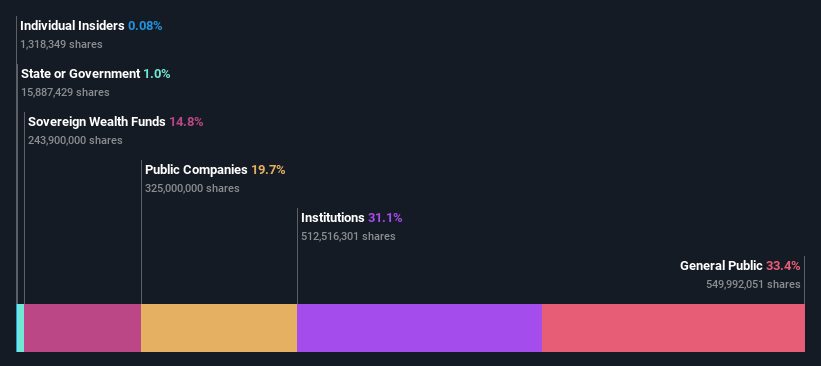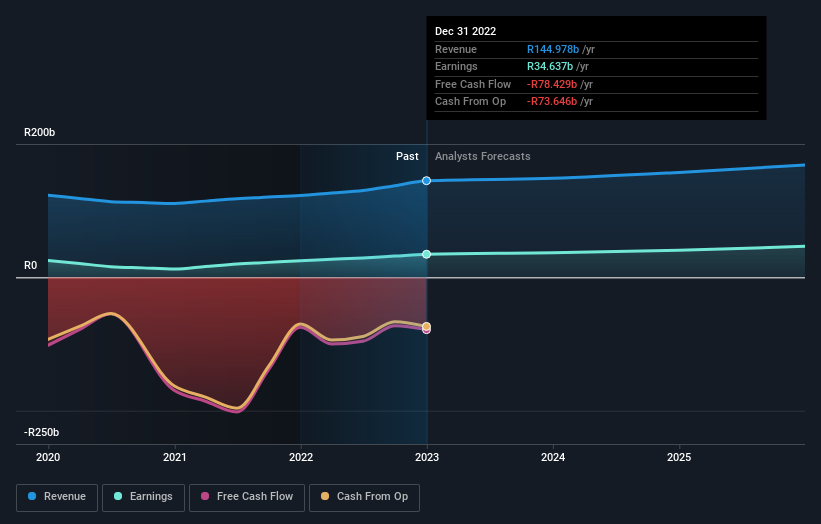- South Africa
- /
- Banks
- /
- JSE:SBK
Standard Bank Group Limited's (JSE:SBK) largest shareholders are retail investors with 33% ownership, institutions own 31%

Key Insights
- Significant control over Standard Bank Group by retail investors implies that the general public has more power to influence management and governance-related decisions
- A total of 9 investors have a majority stake in the company with 51% ownership
- 31% of Standard Bank Group is held by Institutions
A look at the shareholders of Standard Bank Group Limited (JSE:SBK) can tell us which group is most powerful. With 33% stake, retail investors possess the maximum shares in the company. That is, the group stands to benefit the most if the stock rises (or lose the most if there is a downturn).
Institutions, on the other hand, account for 31% of the company's stockholders. Generally speaking, as a company grows, institutions will increase their ownership. Conversely, insiders often decrease their ownership over time.
In the chart below, we zoom in on the different ownership groups of Standard Bank Group.
See our latest analysis for Standard Bank Group

What Does The Institutional Ownership Tell Us About Standard Bank Group?
Many institutions measure their performance against an index that approximates the local market. So they usually pay more attention to companies that are included in major indices.
Standard Bank Group already has institutions on the share registry. Indeed, they own a respectable stake in the company. This implies the analysts working for those institutions have looked at the stock and they like it. But just like anyone else, they could be wrong. If multiple institutions change their view on a stock at the same time, you could see the share price drop fast. It's therefore worth looking at Standard Bank Group's earnings history below. Of course, the future is what really matters.

We note that hedge funds don't have a meaningful investment in Standard Bank Group. Industrial and Commercial Bank of China Limited is currently the largest shareholder, with 20% of shares outstanding. With 15% and 5.1% of the shares outstanding respectively, Public Investment Corporation Limited and Coronation Fund Managers Limited are the second and third largest shareholders.
We did some more digging and found that 9 of the top shareholders account for roughly 51% of the register, implying that along with larger shareholders, there are a few smaller shareholders, thereby balancing out each others interests somewhat.
While studying institutional ownership for a company can add value to your research, it is also a good practice to research analyst recommendations to get a deeper understand of a stock's expected performance. Quite a few analysts cover the stock, so you could look into forecast growth quite easily.
Insider Ownership Of Standard Bank Group
While the precise definition of an insider can be subjective, almost everyone considers board members to be insiders. Company management run the business, but the CEO will answer to the board, even if he or she is a member of it.
Most consider insider ownership a positive because it can indicate the board is well aligned with other shareholders. However, on some occasions too much power is concentrated within this group.
Our most recent data indicates that insiders own less than 1% of Standard Bank Group Limited. Being so large, we would not expect insiders to own a large proportion of the stock. Collectively, they own R200m of stock. In this sort of situation, it can be more interesting to see if those insiders have been buying or selling.
General Public Ownership
The general public, who are usually individual investors, hold a 33% stake in Standard Bank Group. While this size of ownership may not be enough to sway a policy decision in their favour, they can still make a collective impact on company policies.
Public Company Ownership
We can see that public companies hold 20% of the Standard Bank Group shares on issue. It's hard to say for sure but this suggests they have entwined business interests. This might be a strategic stake, so it's worth watching this space for changes in ownership.
Next Steps:
While it is well worth considering the different groups that own a company, there are other factors that are even more important. Take risks for example - Standard Bank Group has 1 warning sign we think you should be aware of.
If you are like me, you may want to think about whether this company will grow or shrink. Luckily, you can check this free report showing analyst forecasts for its future.
NB: Figures in this article are calculated using data from the last twelve months, which refer to the 12-month period ending on the last date of the month the financial statement is dated. This may not be consistent with full year annual report figures.
New: Manage All Your Stock Portfolios in One Place
We've created the ultimate portfolio companion for stock investors, and it's free.
• Connect an unlimited number of Portfolios and see your total in one currency
• Be alerted to new Warning Signs or Risks via email or mobile
• Track the Fair Value of your stocks
Have feedback on this article? Concerned about the content? Get in touch with us directly. Alternatively, email editorial-team (at) simplywallst.com.
This article by Simply Wall St is general in nature. We provide commentary based on historical data and analyst forecasts only using an unbiased methodology and our articles are not intended to be financial advice. It does not constitute a recommendation to buy or sell any stock, and does not take account of your objectives, or your financial situation. We aim to bring you long-term focused analysis driven by fundamental data. Note that our analysis may not factor in the latest price-sensitive company announcements or qualitative material. Simply Wall St has no position in any stocks mentioned.
About JSE:SBK
Standard Bank Group
Provides financial products and services in South Africa and internationally.
Adequate balance sheet average dividend payer.
Similar Companies
Market Insights
Community Narratives



